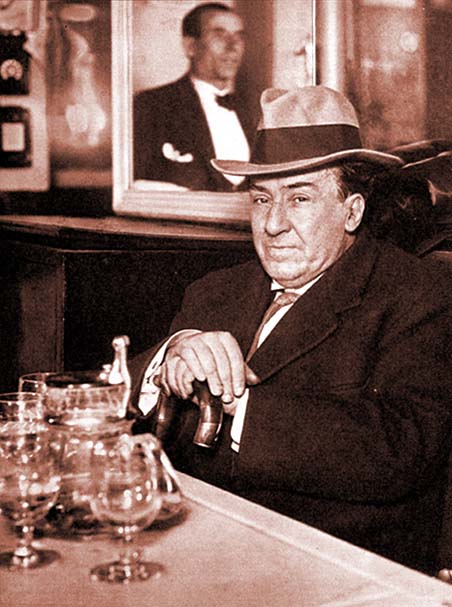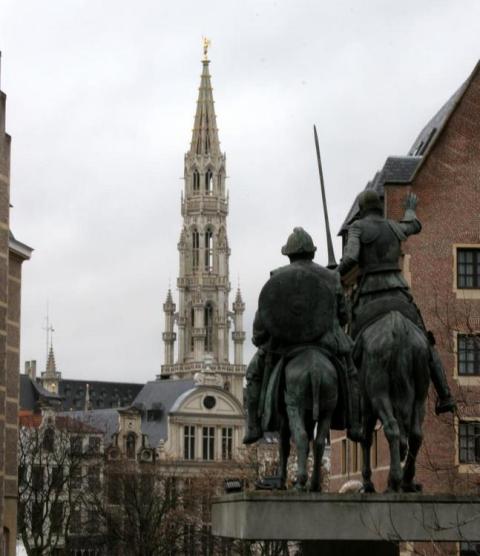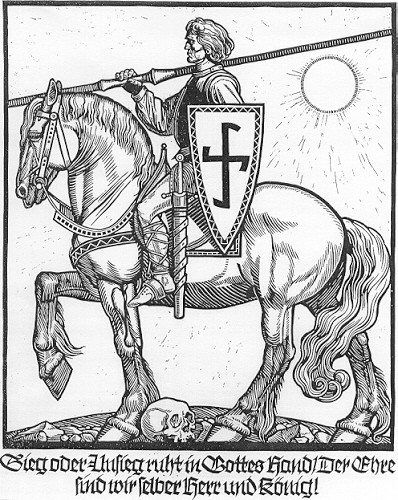ANTONIO MACHADO ON THE (so-called) "MASTER RACE"
(Translated by C.W. Porter)

Antonio Machado, the greatest modern poet in the Spanish language, was a Republican sympathizer, trapped in Madrid by the Nationalist uprising and siege in 1937.
Note that to Machado, the term "pueblo de señores" -- precisely equivalent, in Spanish, to "Herrenvolk" in German -- is the expression of a profound belief in human equality, human dignity, the worth of popular literature and the so-called common people.
The point is that "Master Race" is not the only possible translation for this kind of thing.
Antonio Machado
On the Defense and Dissemination of Culture
The Poet and the People
When someone asked me, many years ago, “Do you think a poet should write for the people, or isolate himself in an ivory tower?” – a popular topic in those days – “dedicated to aristocratic activity in spheres of culture which are only accessible to a select minority?” I answered as follows, which many people thought a bit naive: “To write for the people’, said a master, ‘what more could I wish? Because I wanted to write for the people, I learned as much as I could from the people... To write for the people is, first of all, to write for the men of our race, our language... writing for the people forces us... to write for the men of other races, of other lands and languages. Writing for the people means to call yourself Cervantes, in Spain; Shakespeare, in England; Tolstoy, in Russia. This is the miracle of the genius of language. Perhaps some of these men achieved this without even wishing to. The day will come when it will be the supreme aspiration of a poet... As for myself...I don’t believe I’ve ever been anything but a folklore specialist... an apprentice, in my way, in popular knowledge.
This response of mine was that of a Spaniard aware of his Hispanicity... in Spain, almost everything great is the work of the people or for the people... in Spain, everything which is essentially aristocratic is, in a certain way, popular. During the first few months of the war which is now drenching Spain with blood, when the dispute had not yet lost its character as a mere civil war, I wrote these words to justify my democratic faith, my belief in the superiority of the people over the privileged classes.
The militia men of 1936
Después de puesta su vida tantas veces por su ley al tablero... [After staking his life so many times for his law…]
Why do I recall this phrase from Jorge Manrique [Spanish poet and soldier], every time I see the portraits of our militia men while leafing through newspapers and magazines? Perhaps it’s because these men... carry in their faces the serious frown and expression of concentration, absorbed in things invisible, of men, who, as the poet says, “stake their life for their law”, betting the only coin they have – if you lose it, you don’t have another – for a cause which they feel deeply. The truth is that all these militia members look like captains, such is the noble Señorío [manliness, dignity] in their faces.
When a great city – like Madrid in those days – suffers a tragic experience, it undergoes a total change of physiognomy; and in that change, we notice a strange phenomenon, which makes up for a great lot of bitterness: the sudden disappearance of the Señorito [weakling, fashionable snob, unmanly person]. And it’s not because the Señorito -- as some people think – runs away or goes into hiding; rather, he disappears – literally – he eclipses himself, he is effaced by human tragedy, he is wiped out by the underlying Man. The truth is that, as Juan de Mairena [Spanish poet and philosopher] used to say, there are no Señoritos, rather, there is “Señoritismo”, a form, among various others, of degraded masculinity, a particular method of being a man, sometimes observed in individuals from a variety of social backgrounds, and which has nothing to do with starched collars, neckties or shined shoes.
Among us, we Spaniards – we who are not, of course, Señoritos to the slightest degree ourselves – Señoritismo [snobbery, effeminacy] is an epidemic disease, the origins of which may perhaps be found in our Jesuit education, which is profoundly anti-Christian, and – let us say so with pride – profoundly anti-Spanish. Señoritismo is based on an erroneous and servile appraisal of values, one which sets the more superficial social factors – indications of class, such as clothing, sartorial elegance – above religious and human values properly speaking. Señoritismo knows nothing – is content to know nothing – like a Jesuit – of the insuperable dignity of Man. The people, by contrast, are aware of that dignity, and uphold it: a dignity which finds its firmest foundation and popular ethic in the people. “No one is more than anyone”, [“Nadie es más que nadie”] says an old, prayer-like Castilian adage. Perfect expression of modesty and pride! If “no one is more than anyone”, it is because no one is entitled to prevail over others: there is a winner in all things, varying with circumstances of place and time. “Nadie es más que nadie”, because – and this is the most profound sense of the phrase – regardless of what a man may be worth, he can never possess a value higher than that of being a man. Thus speaks Castile, a Nation of Men [pueblo de señores], which has always despised weaklings [el Señorito].
When El Cid [famous figure in the reconquista of Spain from the Moors], the Señor [Lord] ... in breaking the siege of Valencia by the Moors, calls his wife, Doña Jimena, and daughters, Elvira and Sol, to come see “how he earns his living”. Such is the divine modesty with which Rodrigo [the Lord, El Cid] speaks of his own exploits... Together with El Cid, a great lord [Señor] over himself, the immortal epic poem [depicts] the princes of Carrión -- cowardly, vain and vindictive – and two criminal Señoritos, the definitive stamp of a depraved aristocracy. Someone has commented -- with a certain degree of truth -- that the [poem] depicts the struggle between a rising democracy and an aristocracy in decline. I would say, rather: between Castilian manliness [hombría castellana] and the Señoritismo [effete snobbery] of León in those days.
... Among Spaniards, that which is most essentially human is found with the greatest purity and most marked relief in the popular soul. I do not know whether you can say the same thing of other countries. My folklore never crossed the borders of my country. But I dare say with certainty that, in Spain, the aristocratic prejudice of writing exclusively for the “best” people may be accepted and even converted into a literary standard, with this one proviso: the aristocracy of Spain lies in the people; it is in writing precisely for the people that we write for the “best”. If one wished, piously, to avoid excluding the so-called “high-classes” from the enjoyment of popular literature, it would be necessary to reduce the human level and aesthetic quality of such work.... and mix it with frivolities and pedantic display... in all our great literature, almost everything which is not folklore is pedantry... either we write, consciously and without compromise, for the people, or we will only write nonsense...
Antonio Machado, “El Poeta y el Pueblo”, 16 July 1937
---
End of translation
---
CONCLUSION:
"Pueblo de Señores" does not mean "Master Race". Neither does "Herrenvolk". That is the point.
Both terms are examples of the patriotic, egalitarian jargon common to all political systems, nothing more.
Another perfectly correct (and highly plausible) translation of "Herrenvolk" into Spanish would be "Pueblo de Caballeros".
"Herren" on a door means exactly the same thing in German as "Señores" or "Caballeros" in Spanish: it means "Men" or Gentlemen" (usually, men's toilet).
A certain degree of "Ritterlichkeit"or chivalry is inherent in the concept of "Herr"; a "caballero" is a gentleman or knight.
A "knight errant" in Spanish is a "caballero errante": Don Quijote!
What could be more Spanish than that?

No one would bomb Spain back into the Stone Age if the Spanish insisted on referring to themselves as a "Pueblo de Caballeros".
They could do so for centuries and no one would care.
Why should "Herrenvolk" be any different?
---
Obviously, "Herrenvolk" is "Herrenvolk", and not "Rittervolk", a "Nation of Knights"; that would be an exaggeration.
Yet some degree of "Ritterlichkeit" or chivalry is inherent in the concept of "Herr".
If it were the intention of the speaker to refer to the citizens of his own country as a "People United in the Selfless Service of Some Great Ideal" -- like the Teutonic Knights of the Middle Ages -- use of some similar word in this sense would be quite plausible in any language.

---
Note -Disclaimer
Return to Myth of the Master Race
The Myth of "Kadavergehorsam" by C.W. Porter
The Myth of the "Master Race" by C.W. Porter
The Myth of the "Thousand Year Reich" (about half-way down)
See also:
http://www.persecucionreligiosa.es/expo.html


